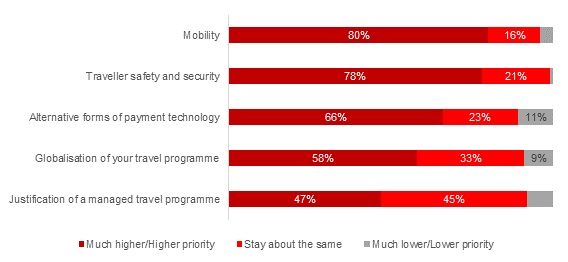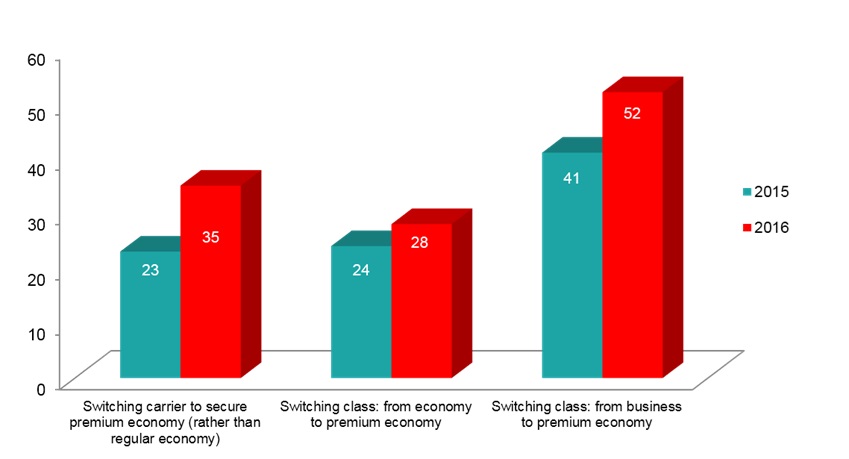|
According to Sabre's 2017 Asia Pacific Corporate
Traveller study, 80% of travel managers now believe mobility to be
the biggest priority in managing corporate travel.
Another finding underscores the rise of
premium economy as a new corporate favourite class, and a third
finds companies trying to stay on top of corporate travellers who
are increasingly deviating from their travel policy.
�The increasing incidence of non-compliance is
the result of corporate travellers booking out of policy, where
they extend business trips to include some leisure time at their
own expense. With more companies shifting accountability of policy
compliance to the traveller, the ability to integrate
non-traditional sources of flight and accommodation, and option to
change plans easily while on the go, will go a long way in helping
the corporate traveller adhere to policy without compromising on
the quality of travel,� said Jason Toothman, vice president of
global accounts, Sabre Travel Network Asia Pacific.
According to the study conducted on corporate
travel professionals from across 19 countries in the region, more
than 43% of corporate travellers are deviating from company
policy ahead of the trip and 42% are making changes while
travelling.
As companies strive to find the balance between
driving compliance and increasing their corporate travellers�
satisfaction, respondents have seen corporations actively
re-crafting their travel policies (32% in 2015 vs 47% in 2016) to accommodate more booking autonomy. One quarter
of respondents also noted that most of their clients have deployed
mobile app(s) that incorporate policy compliance options,
shifting accountability of compliance to the traveller.
Rise of Mobile and
Virtual Payment Technologies

When asked what it is they considered to be the
biggest priority in managing corporate travel in their
organisation, 80% of travel managers believe mobility �
from making a booking through a mobile device, to itinerary
management, to staying in touch with their traveller via instant
messaging - is their top priority, highlighting the importance
placed on moving towards a mobile first strategy. 66% also
quoted looking at alternative forms of payment technology as a
high priority area for them.
Today, new technologies are emerging at a rapid
pace, ultimately opening up countless new revenue channels for
travel companies to tap into. Travel managers have an opportunity
to engage their corporate travellers on multiple devices at all
points of the journey for a truly seamless trip. Product solutions
that can seamlessly integrate booking, itinerary management,
messaging, virtual payments, expenses reporting and travel risk
management will help corporate travellers improve their traveller
experience, whilst helping their organisations maximise
efficiency, streamline expenses and improve compliance.
Premium Economy

Amidst economic uncertainty, companies are
cutting back on premium class air travel and as such, premium
economy options have become the next best alternative without
significantly impacting travellers� comfort. From the report, over
half of the respondents indicated that companies are switching
class from business to premium economy. On the other hand, some
businesses are upgrading travellers from economy to premium
economy for higher traveller satisfaction. Both forces have
contributed to 81% of respondents are seeing an increase in
premium economy bookings.
The Sabre Asia Pacific Travel Study surveyed
corporate travel professionals from 19 key markets across the
region, representing corporate travel management companies and
travel agencies servicing corporate accounts.
Countries covered
included Afghanistan, Australia, Bangladesh, Brunei, Cambodia,
China, Hong Kong, India, Japan, Malaysia, Nepal, New Zealand,
Pakistan, Philippines, Singapore, South Korea, Sri Lanka, Taiwan
and Thailand.
[an error occurred while processing this directive]
|
Headlines: |
|
See latest
HD Video
Interviews,
Podcasts
and other
news regarding:
Sabre,
Trends.
|
